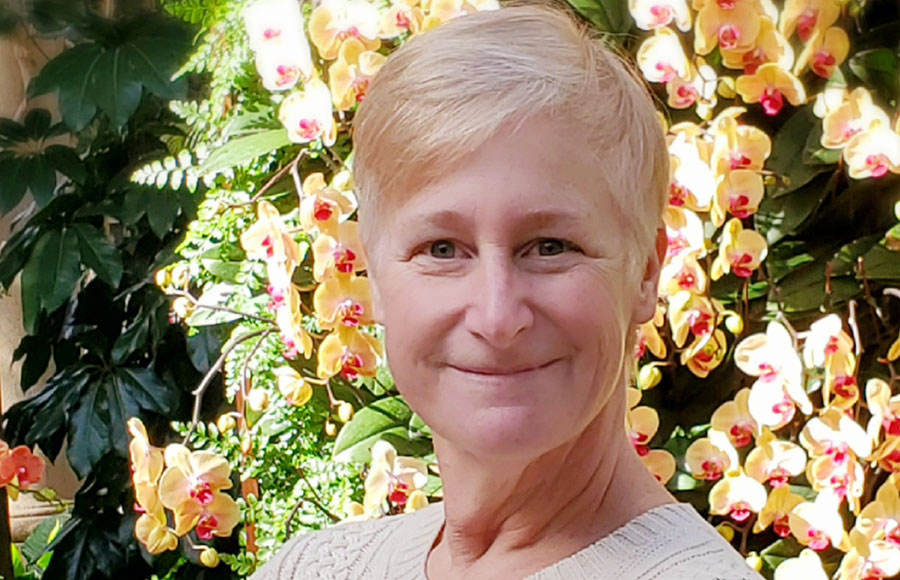BOONE, N.C. — For Appalachian State University alumna Lynn Heinmuller Fisher ’97, making the best out of the worst is a professional calling. Fisher applies her creative thinking and problem-solving skills to handle large-scale disasters and emergencies as the first director of emergency management at Austin Peay State University (APSU) in Clarksville, Tennessee.
Fisher, who was recently named to her APSU position, previously served as the community preparedness program manager for Philadelphia’s Office of Emergency Management.
There, she coordinated responses to disasters, including the Philadelphia Amtrak train derailment in 2015 that resulted in eight deaths and more than 200 injuries. She also served as the command post manager for major events, including the Philadelphia Marathon, as well as parades and special events.
In 2018, Fisher was recognized by the mayor of Philadelphia for creating and implementing the ReadyPhiladelphia preparedness program, working with neighborhoods and civic groups to form plans to assist during disasters. The program was used by the Federal Emergency Management Agency (FEMA) in building resiliency programs in neighborhoods nationwide.
“When my work and efforts are in the spotlight, it usually means that someone is having a terrible day,” Fisher shared. “I often think of victims and hold them in my heart as I respond to any other disaster.”
Fisher said her best days were when she trained groups of citizens and helped them understand they are able to respond to a disaster and assist one other.
Laying the foundation as a Mountaineer
Fisher, who grew up in Maryland, transferred to Appalachian after spending a semester in Banner Elk working at Broadstone — Appalachian’s multifaceted outdoor education facility offering adventures, retreats and conferences. The facility, which operates under Appalachian’s Division of Student Affairs, serves university students, staff, faculty and the Greater Western North Carolina region.
Fisher said she loved Broadstone and its staff so much that she decided to apply to Appalachian. She earned a B.S. in recreational management–outdoor experiential education with a minor in sustainable development.
“Outdoor experiential ed and working at Broadstone was a natural fit for me,” Fisher said. “I was able to expand upon my love of science and share it in a nontraditional classroom setting.”
“I learned so much from Judith Bevan, who was then the director of Broadstone. How do you create an experience that has a deep impact on a young person? How do you solve difficult problems with very few resources during a potentially dangerous situation? These skills directly translated into my career in emergency management,” she continued.
Fisher started her job at APSU in the midst of the coronavirus pandemic, supporting the efforts of a task force that had already been working for a couple of months on issues pertaining to the pandemic. She’ll transition into working with each department at the university to ensure solid plans and actions are in place to address any potential emergency.
“I am grateful for the time at Appalachian that got me out of the classroom and into something greater,” Fisher said.
What do you think?
Share your feedback on this story.
About the Department of Recreation Management and Physical Education
The Department of Recreation Management and Physical Education in Appalachian State University’s Beaver College of Health Sciences is an innovative, diverse and forward-thinking academic unit consisting of two undergraduate programs. The recreation management program prepares students for careers as professionals in three concentrations: commercial recreation and tourism management, outdoor experiential education, and recreation and park management. The health and physical education program prepares students for careers as K-12 health and physical educators, school-based activity directors and coaches. Learn more at https://rmpe.appstate.edu.
About the Beaver College of Health Sciences
Appalachian State University’s Beaver College of Health Sciences (BCHS), opened in 2010, is transforming the health and quality of life for the communities it serves through interprofessional collaboration and innovation in teaching, scholarship, service and clinical outreach. The college enrolls more than 3,600 students and offers 10 undergraduate degree programs, nine graduate degree programs and four certificates across seven departments: Kinesiology, Nursing, Nutrition and Health Care Management, Public Health, Recreation Management and Physical Education, Rehabilitation Sciences, and Social Work. The college’s academic programs are located in the Holmes Convocation Center on App State’s main campus and the Levine Hall of Health Sciences, a state-of-the-art, 203,000-square-foot facility that is the cornerstone of Boone’s Wellness District. In addition, the college supports the Appalachian Institute for Health and Wellness and has collaborative partnerships with the Wake Forest University School of Medicine’s Physician Assistant Program, UNC Health Appalachian and numerous other health agencies. Learn more at https://healthsciences.appstate.edu.
About the Goodnight Family Department of Sustainable Development
One of seven departments housed in the College of Fine and Applied Arts, the Goodnight Family Department of Sustainable Development at Appalachian State University prepares students to thoughtfully analyze human development while focusing on the applied practice of pursuing transformative, community-driven development and social change. It offers a Bachelor of Science degree in sustainable development with concentrations in agroecology and sustainable agriculture; community, regional and global development; and environmental studies; as well as a Bachelor of Arts and minor in sustainable development. Learn more at https://sd.appstate.edu.
About the College of Fine and Applied Arts
Appalachian State University’s College of Fine and Applied Arts is a dynamic and innovative group of seven academic departments, bringing together a variety of perspectives, experiences and real-world education to provide unique opportunities for student success. The college has more than 3,500 undergraduate and graduate majors. Its departments are Applied Design, Art, Communication, Military Science and Leadership, Sustainable Development, Sustainable Technology and the Built Environment, and Theatre and Dance. Learn more at https://cfaa.appstate.edu.
About Student Affairs at App State
Student Affairs at App State supports student success and well-being by fostering a culture of care, inclusion and engagement. Its mission is to develop lifelong learners and dynamic leaders through meaningful experiences that challenge and support students. Grounded in a commitment to care, engage and transform, Student Affairs creates a student-centered environment that encourages resilience, leadership, service and global learning. Student Affairs encompasses the following units: Campus Activities, Case Management, the Child Development Center, Community-Engaged Leadership, Counseling and Psychological Services, Office of the Dean of Students, New Mountaineer and Family Engagement, Off-Campus Student Services, Plemmons Student Union, Student Conduct, M.S. Shook Student Health Service, Student Legal Services, Student Veteran Services, University Recreation, and Wellness and Prevention Services. Learn more at https://studentaffairs.appstate.edu.
About Appalachian State University
As a premier public institution, Appalachian State University prepares students to lead purposeful lives. App State is one of 17 campuses in the University of North Carolina System, with a national reputation for innovative teaching and opening access to a high-quality, cost-effective education. The university enrolls more than 21,000 students, has a low student-to-faculty ratio and offers more than 150 undergraduate and 80 graduate majors at its Boone and Hickory campuses and through App State Online. Learn more at https://www.appstate.edu.





![How NCInnovation Is Rethinking Economic Development in North Carolina [faculty featured]](/_images/_posts/2026/02/rethinking-economic-development-600x400.jpg)







